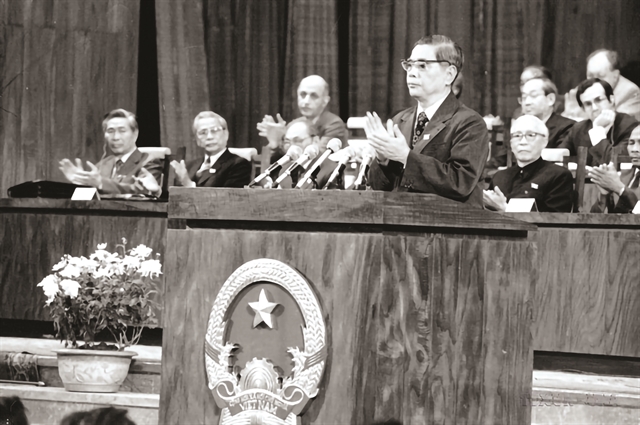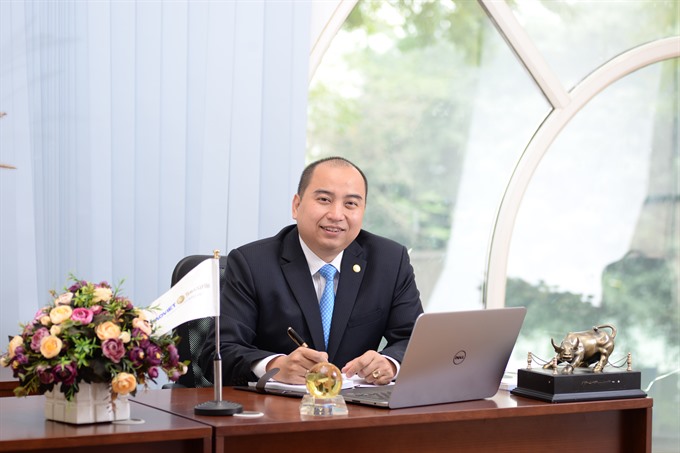 Economy
Economy

Five big State-owned corporations will conduct initial public offerings (IPOs) in the first quarter. Market insiders give their forecast on the IPO prospects, market-absorption capacity and impact on the Government’s equitisation process this year.
by Mai Hương and Hoàng Sơn
 |
| In focus: Economist Nguyễn Trí Hiếu says the Government should focus on essential sectors. |
Nguyễn Trí Hiếu – economist
I have an optimistic outlook for these five IPOs. The sentiment on the securities market is now strong with the VN-Index reaching more than 1,000 points. In addition, three energy companies – BSR, PV Oil and PV Power – play an important role in Việt Nam’s energy sector.
In fact, five companies floating a mammoth volume of shares in the short term could affect sales success and create lower selling prices, but this may not be an obstacle thanks to the attractiveness of these five corporations to foreign investors keen on investment in Việt Nam, especially those from South Korea interested in oil and gas.
Before making a decision, foreign investors often conduct due diligence activities to study the target company’s financial state, performance and development prospects. This is an important process. The second most important factor is the price. In any market, price will determine the attractiveness of the goods. Việt Nam’s overall P/E market is about 20x while P/E of BSR’s shares stand at about 10x, which values its shares at VNĐ23,000-25,000 (more than US$1) each. BSR is offering shares at the initial price of VNĐ14,6400 per share, lower than the price the market may accept.
I think five companies will offer prices lower than the market, which is favourable for the IPOs. Among five corporations, Việt Nam Rubber Group will likely be less eye-catching due to poor profits. However, this can be offset by the potential growth of the rubber sector. Rubber is an essential material for the car industry and Việt Nam has the advantage of growing and processing rubber.
The success of these five IPOs would create a big impetus for the Government’s equitisation process this year. This process should be accelerated as soon as possible. In principle, the Government should withdraw investments and focus on sectors that are very essential to national security and social welfare. What the private sector does is its own business.
 |
| Prospects are good: Andy Ho – VinaCapital Chief Investment Officer, says Viet Nam is now on foreign business radars. |
Andy Ho – VinaCapital chief investment officer
We believe that the prospects for these five IPOs will be good. Some will be oversubscribed (there is already some indication that BSR is oversubscribed by 3x) while others might be slightly undersubscribed. With oil prices rebounding, the two companies in the oil and gas sector (BSR and PV Oil) should attract a fair amount of interest. Obviously, if the Government can sell its shares at prices significantly higher than the minimum price, then the IPOs will be even more successful.
We don’t think there will be a problem with absorption as Việt Nam is now on the radar of many foreign investors, who bought $1 billion in stocks last year. Institutional demand, whether strategic or financial, is solid as seen with Sabeco and Vinamilk. There are also indications that institutional financial investors continue to be bullish on Việt Nam, with high subscriptions for a couple of the IPOs scheduled for January. Retail investors are also optimistic about the market as recent IPOs have done well and they think the new IPOs could do the same. Moreover, these IPOs are each in the hundreds of millions dollar, not billions, and in the context of the stock market, these are not too large, given that liquidity is now more than $200 million a day. Good companies will always get absorbed.
These will set the tone for the rest of the year. If they are successful, then other upcoming IPOs will be more likely to be successful, and vice versa. Also from the Government’s perspective, if these IPOs go well, it may give them the impetus and motivation to push harder on equitisation plans (that is, doing more IPOs) because the momentum and pricing are good.
Nguyễn Minh Ngọc – director, Corporate Finance Division, Bảo Việt Securities
 |
| Nguyễn Minh Ngọc |
Considering the number of State-owned enterprises that have been equitised, the period 2003-06 could be seen as a boom period when more than 2,600 SOEs were equitised. However, in terms of quality, we saw only medium and small-sized enterprises, even micro-sized ones, equitised. After a nearly 30-year period of equitisation, the remaining SOEs that need equitising have changed in quality. There may not be many of them, but they are mainly the core businesses of the economy with large scales of capital and total assets.
Therefore, I think that the upcoming five IPOs will draw the attention from domestic and foreign investors and improve the local market sentiment. Both foreign and domestic investors will see these IPOs as golden opportunities to own big core businesses, so they definitely will not miss these chances. In addition, the foreign money flowing into Việt Nam in 2017 that helped the country’s foreign exchange reserves last year reach a record level of $50 billion, mean a large amount of Vietnamese currency has been pumped into the financial market by the State Bank of Việt Nam absorbing that amount of foreign currencies, creating large spillover effects for the Vietnamese economy.
These are the IPOs of industry-led companies that have good fundamentals and positive business prospects. With total market capitalisation amounting to about $7.8 billion based on their initial IPO prices and the post-IPO share listing in accordance with Circular 115/2017/TT-BTC, these five companies will be among the top largest companies by market capitalisation. Their listing will help increase the amount of high-quality goods for the market and draw more foreign capital into the Vietnamese securities market.
So far, the volume of pre-order share purchases for BSR and PV Oil has exceeded by two to three times the number of shares offered for sale, proving that both domestic and foreign investors are highly interested in the upcoming IPOs. In addition, after the Government’s recent successful divestments of Vinamilk and Sabeco and positive investor sentiment in the securities market, we believe that these IPOs will be successful.
In recent years, IPO, listing and divestment of SOEs have been sped up. Such movement has attracted capital from both domestic and foreign investors, increased high-quality goods for the securities market and contributed to the growth of the Vietnamese securities market. Based on our market observation, after large-cap companies undertake their IPOs and list shares on the stock market, they will move positively and create good impacts to drive the market up.
Although the upcoming IPOs are large in scale compared to the history of SOE equitisation, they are still small compared to other deals in the world and are absolutely affordable to foreign investors. This is not a big concern for them as they are highly attracted to large-scale core businesses that have great roles and impacts on the economy. I am optimistic that foreign investors are very interested in these opportunities.
Investors, however, should be cautious with large-cap stocks pumped into the market in 2018 that would require a large amount of capital to absorb. As a result, a large number of stocks would become less favourable by investors and no longer on the priority lists of large funds. They would be sold out and their prices would fall.
But I think there would be more positive than negative impacts on the securities market from those deals because stocks whose share prices could fall do not account for a large part of the market capitalisation. And more importantly, the economy and the market are still in the growth stage, thus, the investment funds will still be able to mobilise more financial resources to go after those deals.
As we know, Việt Nam’s foreign exchange reserves have reached a record high of more than US$54 billion, including a significant increase of foreign capital flowing into the securities market. By the end of November 2017, foreign indirect investment flowing into the country had reached $5.29 billion, an increase of 58 per cent over the same period in 2016, not to mention the $5 billion earned from the Sabeco share sale.
The success of the upcoming five IPOs will bolster the equitisation of the remaining SOEs in 2018. Big investors, both foreign and domestic, will see this as a golden opportunity to dominate the Vietnamese economy. In addition, strategic investors will have favourable policies if they make investment in SOEs whose equitisation plans for 2018 have been approved, than taking part in these five IPOs and previous deals.
According to Decree 126/2017 on SOE equitisation, strategic investors will be able to sell purchased shares three years after the deal is completed instead of five years as before. The quality of strategic investors will also improve as a strategic investor is required to have operated for more than two years as an organisation and have no accumulated losses. These requirements will create strategic investors with higher financial capability, improve the performance of the equitised SOEs and reduce risks for minor investors.
However, the signal of improvement is not likely to come from equitised SOEs and from those that the Government wants to continue divesting. It is the internal and external factors that make business attractive to investors. — VNS